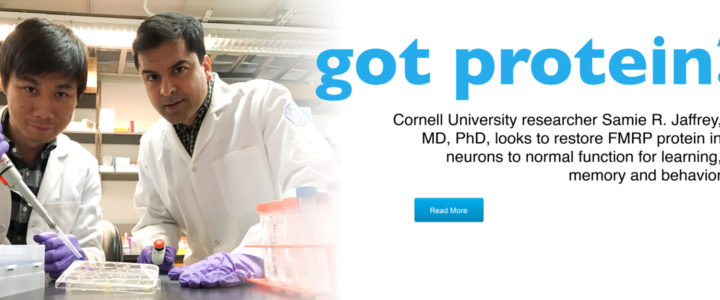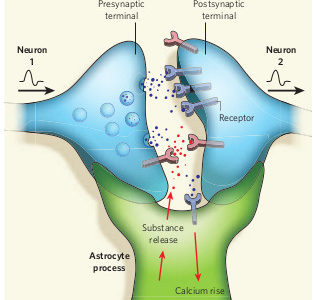With a $90,000 grant from FRAXA Research Foundation over 2016-2018, Dr. Carolyn B. Smith and Dr. Rache Sare at the National Institute of Mental Health investigated the basis of sleep problems in Fragile X syndrome.
Read moreNIH
Cornell University Researcher Looks to Restore Fragile X Protein in Neurons

Which is the right FMRP for therapeutic development of Fragile X syndrome? When researchers develop effective drugs that reactivate FMRP — the protein that is normally silenced in Fragile X — what in the world will they do next? So ponders Cornell University researcher Samie R. Jaffrey, MD, PhD. Jaffrey, professor, Pharmacology, Weill Cornell Medical College, Cornell University, knows reactivating FMRP will lead to many important questions, such as: Which cell type needs FMRP? How much FMRP protein is needed to restore brain function? Where in the brain will FMRP protein be needed? Where in a neuron will the FMRP needs to be expressed?
Read moreResearcher David Nelson, PhD, Explores New Cell Strategies for Fragile X Syndrome, FXTAS and FXPOI

It’s rare to find a researcher working on the Big Three — Fragile X Syndrome (FXS), Fragile X-associated Tremor/Ataxia Syndrome (FXTAS) and Fragile X-associated primary ovarian insufficiency (FXPOI). Then again, David Nelson, PhD, is the rare bird. Nelson is a professor of Molecular and Human Genetics, Baylor College of Medicine, and director of Baylor’s Graduate Program in Integrative Molecular and Biomedical Sciences. He has been involved in FXS research since the late 1980s where he helped identify the mutation and the FMR1 gene. These days, researchers in Nelson’s lab at Baylor are studying FXS, FXTAS and FXPOI using mouse models.
Read moreThe X Factor – Turning on X Chromosome Genes to Treat X-linked Disorders

Harvard researcher Jeannie T. Lee, MD, PhD, moves closer to turning on select genes on the X chromosome to treat people with X-linked disorders.
Read moreFragile X Fruit Fly Research Bears Fruit

A new FRAXA-funded study shows how the hormone insulin – usually associated with diabetes — is involved in the daily activity patterns and learning deficits in the fruit fly model of Fragile X Syndrome (FXS). The study also reveal a metabolic pathway that can be targeted by new and already approved drugs to treat Fragile X patients, notably metformin.
Read moreFragile X Cure One Step Closer with FRAXA Support of $1 Million in New Research

4 Countries – 10 Teams – $1 Million for finding new treatment targets, to pinpointing outcome measures for future clinical trials, to attempting to reactivate the gene which is silenced in Fragile X syndrome, these innovative scientists will bring us closer to a cure.
Read moreAbnormalities of Synaptic Plasticity in the Fragile X Amygdala

With a $110,050 grant from FRAXA Research Foundation from 2005-2016, Dr. Sumantra Chattarji at the National Center for Biological Sciences researched how the amygdala is affected by Fragile X syndrome. Results published.
Read moreNeuren’s Tofinetide Successful in Phase 2 Clinical Trial in Fragile X

We are pleased to share great news adapted from Neuren’s press release: Neuren’s phase 2 trial has successfully established proof of concept and provides a strong rationale for Neuren to move forward with developing trofinetide for Fragile X syndrome. In this initial small trial with a relatively short treatment period, trofinetide was very well tolerated, with the high dose (70 mg/kg twice daily) demonstrating a consistent pattern of clinical improvement, observed in both clinician and caregiver assessments.
Read moreFRAXADev – Developing BK Channel Openers for Fragile X Syndrome

A number of people have asked us about FRAXADev, a new project starting in France; this is a nonprofit initiative which seeks to develop a new kind of drug for Fragile X. The drugs they are interested in testing in Fragile X clinical trials were developed by Bristol-Myers Squibb many years ago, and are now off patent. This class of drugs opens a potassium channel in the membrane of neurons, which helps to decrease neuronal excitability.
Read moreFruit Flies to Model and Test Fragile X Treatments

Dr. Jongens and his collaborators have found an insulin-like protein in the fly brain that is overexpressed in the Fragile X mutant fly, leading to increased activity of the insulin signaling pathway. Furthermore, they found that certain behavioral patterns in the Fragile X flies can be rescued by expressing the FX gene just in insulin producing neurons in the fly brain. In the mutant, there are other changes in the signaling pathways, including a decrease in cAMP and elevation in PI3K, mTOR, Akt and ERK activity. They now propose to study 2 medicines used for diabetes: pioglitazone (increases cAMP and decreases Akt and ERK) and metformin (inhibits mTOR), in flies and mice to validate the potential efficacy of these novel therapeutics for Fragile X.
Read moreFragile X Treatment: New Research Directions

In the wake of negative results from several high-profile clinical trials in Fragile X, we find ourselves questioning many of our previous assumptions about the nature of this disorder. After all, understanding the basic pathology of disease is critical to development of new treatments — this is true across the board, in all branches of medicine.
Read moreFragile X Programs at UMASS – University of MA, Worcester

Fragile X Syndrome Behavioral Health Clinic The Center for Autism and Neurodevelopmental Disorders (CANDO) is opening a specialty clinic for individuals with Fragile X Syndrome (under the direction of Dr. Jean Frazier) to evaluate and provide treatment for behavioral challenges.
Read moreThe Endocannabinoid System in a Mouse Model of Fragile X Syndrome

With a $128,500 grant over 2011-2013 from FRAXA Research Foundation, Drs. Bradley Alger and Ai-Hui Tang at the University of Maryland researched endocannabinoid pathways in Fragile X.
Read moreInhibitors of STEP as a Novel Treatment of Fragile X Syndrome

With a $349,000 grant from FRAXA Research Foundation from 2008-2015, Dr. Paul Lombroso and his team at Yale University researched if inhibiting STEP could reduce behavioral abnormalities in Fragile X syndrome. Results published.
Read moreNIH Awards $35 Million to Three Fragile X Research Teams

The National Institutes of Health has just announced new awards of $35 million over five years to support three Centers for Collaborative Research in Fragile X. Investigators at these centers will seek to better understand Fragile X-associated disorders and work toward developing effective treatments. All of these scientists have been funded for years by FRAXA Research Foundation, and now each team will receive over $2 million per year for five years!
Read moreFunctional Interplay Between FMRP and CDK5 Signaling
With a $180,000 grant from the FRAXA Research Foundation over 2011-2014, Dr. Yue Feng and Dr. Wenqi Li at Emory University will study CDK5 pathway function and regulation in an effort to break down whether and how CDK5 signaling is affected by the loss of the Fragile X protein, FMRP, in the Fragile X mouse model.
Read moreComputational Analysis of Neural Circuit Disruption in Fragile X Model Mice

Computer modeling of the brain offers the hope of predicting how the brain responds to varying conditions, but these models have been rather primitive until recently. The Sejnowski team at the Salk Institute, who specialize in computational models of neural networks, will take the results of previous FRAXA-funded projects and incorporate them into their advanced computer models of brain function.
Read moreWhy Did Fragile X Clinical Trials of mGluR Antagonists Fail?

by Michael Tranfaglia, MD. In my opinion, the Fragile X clinical trials of AFQ056 sponsored by Novartis failed because of a dose range that was inadequate for Fragile X, and because of the unexpected development of tolerance.
Read moreWhat Treatments Work for FXTAS?
Many older family members in the Fragile X community are affected by FXTAS (Fragile X-associated Tremor/Ataxia Syndrome). We all hope that knowing the underlying cause of neurodegenerative symptoms in FXTAS will help in the development of specific treatments over the long term. In the short term, we would also hope that having a specific diagnosis would help us to identify particular available treatments which might be more effective than others.
Read moreScientists Uncover Trigger for Fragile X Syndrome

A new study led by Weill Cornell Medical College scientists shows that Fragile X syndrome occurs because of a mechanism that shuts off the gene associated with the disease. The findings, published today in Science, also show that a compound that blocks this silencing mechanism can prevent Fragile X syndrome – suggesting a similar therapy may be possible for 20 other diseases that range from mental retardation to multisystem failure.
Read moreSmall Molecules To Target r(CGG) Expansions to Treat Fragile X Syndrome

With a 2-year, $90,000 grant from FRAXA Research Foundation, Dr.’s Matthew Disney and Wang-Yong Yang worked to correct the underlying problem in Fragile X: the silencing of the Fragile X gene (FMR1) and the resulting lack of FMRP (Fragile X Mental Retardation Protein). Their approach was to use novel small molecules to target the abnormal CGG repeats before the FMR1 gene.
Read moreTranslation-Independent Functions of FMRP in Excitability, Synaptic Transmission and Plasticity

With a $140,000 grant from FRAXA Research Foundation, Dr. Vitaly Klyachko and team at Washington University explored STP (short-term plasticity) in Fragile X, namely looking at presynaptic calcium dynamics as a major underlying cause of the STP defects.
Read moreGlycogen Synthase Kinase-3 (GSK3), Lithium and Fragile X

With $208,000 in funds from FRAXA Research Foundation, Dr. Richard Jope and his team at the University of Miami tested whether newly developed, highly specific inhibitors of GSK3 can reduce behavioral abnormalities in Fragile X mice.
Read moreMatrix Metalloproteinase Therapeutic Treatments for Fragile X Syndrome

With a $157,000 grant from the FRAXA Research Foundation in 2012-2013, Dr. Kendal Broadie and Dr. Cheryl Gatto worked to define the distinct but also overlapping roles for MMP-1 and MMP-2 in synaptic structural and functional development. In drug studies with Fragile X fruit flies, they will be testing a range of MMPIs in drug treatments to compare effectiveness during development and at maturity, in order to define the contributions of FXS developmental impairments and adult recovery/plasticity.
Read moreEffects of minocycline on vocal production and auditory processing in a mouse model of Fragile X

With $135,000 in grants from FRAXA Research Foundation over several years, Dr. Khaleel Razak and Dr. Iryna Ethell explored robust biomarkers relevant to the FXS and the efficacy of minocycline treatment.
Read more
